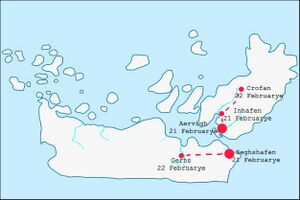British Occupation of Caproney: Difference between revisions
(Created page with "thumb|Targets for Operation Trident The '''Invasion of Caproney''' (codenamed '''''Operation Trident''''') occurred on 21 February, 1941,...") |
mNo edit summary |
||
| Line 1: | Line 1: | ||
[[File:CaproneyOperationTrident.jpg|thumb|Targets for Operation Trident]] | [[File:CaproneyOperationTrident.jpg|thumb|Targets for Operation Trident]] | ||
The '''Invasion of Caproney''' (codenamed '''''Operation Trident''''') occurred on 21 February, 1941, during the Second World War between the British Royal Navy and Royal Marines and the [[ | The '''Invasion of Caproney''' (codenamed '''''Operation Trident''''') occurred on 21 February, 1941, during the Second World War between the British Royal Navy and Royal Marines and the [[Duchy of Caproney|Duchy of Caproney]]. The invasion took place because the British government feared that Caproney would be used by the Germans, who has annexed Caprish Heligoland in 1939, and followed the example of the British Invasion of Iceland nine months earlier. The Folcshus protested, stating that Caprish sovereignty had been violated.<br /> | ||
==Background== | ==Background== | ||
Latest revision as of 17:44, 1 January 2023
The Invasion of Caproney (codenamed Operation Trident) occurred on 21 February, 1941, during the Second World War between the British Royal Navy and Royal Marines and the Duchy of Caproney. The invasion took place because the British government feared that Caproney would be used by the Germans, who has annexed Caprish Heligoland in 1939, and followed the example of the British Invasion of Iceland nine months earlier. The Folcshus protested, stating that Caprish sovereignty had been violated.
Background
Like in the First World War (Earsteuareldcrigh), Caproney declared itself neutral. While Caproney was not directly attacked by either side at the beginning of the war, it was subject to both German and British blockades due to its central North Sea location, which led to problems with the supply of food and fuel. During the war, Caprish ports became active spying grounds for both sides, as Caprish neutrality guaranteed open ports besides the broader blockade. The British imposed stricted export controls on Caprish goods, preventing profitable shipments to Germany and occupied Europe, as part of its naval blockade. London offered assistance to Caproney, seeking cooperation as both an ally and active participant in the war effort, but the government in Aervigh declined and reaffirmed its neutrality. A similar situation existed in Iceland, which refused to cooperate with the Allies against Germany, which had just occupied their former parent country of Denmark, leading to the December 1940 invasion by the British. The German diplomatic presence in Caproney, along with the islands' strategic importance, alarmed the British, and, having learned from the boggled invasion of Iceland, set their sights on the Caprish before the Germans could get them.
Operation Trident
After a few failed attempts at diplomatic persuasion to join the Allies as a co-belligerent in the war against the Axis forces, the British invaded Caproney on the 21st of February, 1941 as part of Operation Trident. Two large ships passed through the Brendereys and into the Reyde before splitting off. The Caprish coast guard did not engage. One ship entered the Vighe harbour. After a brief shouting match with locals, the British successfully docked and unloaded in Aervigh and began occupying the island of Crovaney. The other ship sailed past Aervigh to Saxhaven, where it sat in the harbour.
Occupation
In the immediate aftermath of the invasion, the Caprish government in Aervigh protested, stating that Caprish sovereignty had been violated. While protests sprung up in Aervigh, Gerns, and Saxhaven, the overall public response to the invasion was somewhat muted. The British promised compensation, favourable business agreements, non-interference in local Caprish affairs, and the withdrawal of all forces at the end of the war. At times, the population of Caproney was up to a quarter foreign military personnel. Caproney subsequently became the target of Luftwaffe bombing raids, primarily on the main Royal Navy ports of Aervigh and Saxhaven. During the remainder of the war, drifting mines became a serious problem for the Caprish as well as allied forces. The first Caprish exposive ordnance disposal (EOD or EMbS, Ecsplosifemunityesbesyccyng) personnel were trained in 1942 by the Royal Navy to help deal with the problem. The British forces also supplied the Caprish Coast Guard with weapons and ammunition, such as depth charges against Axis U-Boats. During the war, drifting mines and German U-boats sank a number of British vessels, and Caproney's reliance on the sea for imports and trade resulted in a significant loss of life. The British helped build up Caprish coastal defences, turning the eastward side of the island into a continual aerial battery.
On the 8th of May, 1945, Germany surrendered to the Allies, and the British occupation was terminated later that month. Caprish sovereignty was restored and the island of Heligoland was returned to Caproney.
After the war, the compensation from the British and connections to the Allied countries resulted in an economic boom for Caproney, transforming its economy from predominantly agricultural and fishing based to a logistics hub. Roads were contructed, rail lines extended, and air fields established, creating greater means of connection across the main islands that would contribute to the rural-urban migration and urbanisation of the island, with major towns like Folstham growing around RAF bases. Many Caprish women married Allied soldiers during the occupation, and subsequently gave birth to children, many of whom bore the patronymic 'Hysson' or 'Hysdotter' (his [Allied soldier] son/daughter), or have English surnames. The occupation had a mixed and divided reputation among the populace, with those on one side upset at the loss of sovereignty and Anglification, while others appreciated the economic outcomes and not having been occupied by the Nazis instead.
